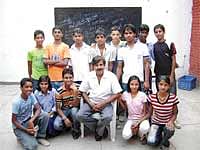
An NGO, Theatre Age, is inspiring people to donate old newspapers which in turn help , it to finance education and two square meals- a- day for these kids. At least 600 households in and around the city have already volunteered to donate newspapers for the venture run by Zulfiqar Khan, president of an NGO, which also harnesses acting, singing and dancing talents of its wards through the medium of theatre. “We are raising Rs 18,000-Rs 20,000 every month by selling old newspapers collected from different parts of the city and the adjoining Mohali and Panchkula,” says Khan, a gold medalist from Panjab University’s theatre department.
The money generated through the mode still falls short for funding the education and other needs of 51 slum kids who include shoe-shine boys, rag pickers and labourers under the charge of Khan. “My dream is to enlist at least 5000 households for regular donation of their discarded newspapers. This will help us become self-self reliant and adequate to sustain the education of 100 slum kids,” Khan. Once every month, Khan and his wards go in an auto rickshaw from house to house to collect the old newspapers and then sell them.
It was in 1992 that Khan, an aspiring actor who wanted to make it big in Bollywood, enrolled slum kids for a play. After the success and huge media coverage of the play, Khan knew that destiny had willed otherwise. Thereafter he resolved to work with these slum kids.
“Initially, we used to collect under a tree for rehearsals and this continued for nearly eight years. The idea of imparting education to these kids came much later when some of them expressed their desire to study,” he says. After years of vagabonding from one place to another, his NGO has been allotted space inside the Government High School in Sector 24 here. Khan has made the four rooms allotted to the NGO a laboratory for his experiment to turn around the lives of these slum kids.
One of the rooms houses computers and study material, another has been turned into a kitchen where older kids take turns to cook food, there is a classroom and another room with sewing machines where the girls learn to stitch. The kids are provided meals and then the study session starts from 3 pm to 6 pm. Thereafter, from 6 to 8 pm, kids start rehearsing for the plays that Khan continues to pursue as part of his hobby and to tap theatrical talent among kids. “The kids return to their homes around 9 pm after having dinner,” he says.
Khan proudly announces that two of his wards have enrolled in colleges this year, one is in Plus Two, 13 are in ninth class and 18 kids are studying in sixth, seventh and eighth classes. For the underprivileged kids, Khan’s intervention in their life has been nothing less than a godsend. Ajay Rana, who has been associated with Khan since 1992, says, “I was a drug addict and had no aim or ambition in life. My life changed after I came in contact with the NGO and Mr Khan inspired me to study and learn theatre.” Now, Rana writes scripts for the plays.
Another superb example is of Vicky Raja, a history-sheeter who was required to mark his presence at the police station on a daily basis. However his life completely changed and he is now a BSF constable. “I enrolled him in my theatre troupe and he was a talented dholak (drum) player. I realised he completely changed after the play was reported in the print media and his photo appeared in local newspapers. He suddenly became responsible and enrolled for study too and was selected as a constable in the BSF,” reminisces Khan.
Amar Pal, now 25, who has been associated with Khan for the past 16 years recalls the life of drudgery and destitution in his slum home. “I would have gone astray like other kids in my slum if I had not come in contact with the NGO,” says Pal while sitting at the computer desk.Khan says that people who are more privileged than the slum dwellers have only to throw their old newspapers to help him transform the life of the ‘slumdogs’.